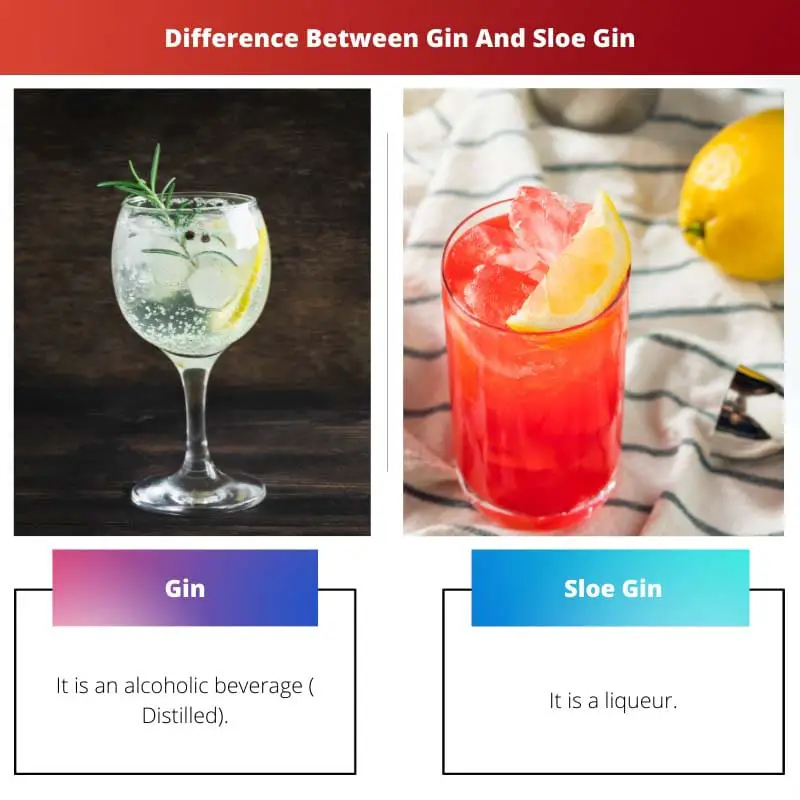Gin and Sloe gin are both alcohol-based beverages. They are both distilled alcoholic beverages. Firstly, gin was originated years ago by monks to use it for medicinal purposes.
Gin and Sloe gin are both used to make cocktails and are also consumed raw. There are many mixes and matches. Sloe gin is one of the types of gin.
But the taste, making process, and way of making are very different. The key differences are mentioned below.
Key Takeaways
- Gin is a distilled spirit made from juniper berries and various botanicals.
- Sloe gin is a fruit liqueur made by infusing gin with sloe berries.
- Gin is clear in color and has a higher alcohol content, while sloe gin has a reddish hue and is sweeter.
Gin vs Sloe Gin
The difference between gin and sloe gin is that gin is made from berries called juniper while sloe gin is made from the fruit of the Sloe flowering plant and gin. Sloe gin is a type of gin. Gin is transparent in color while Sloe gin is red in color.

Gin is an alcoholic beverage that is made from juniper berries. Gin is distilled, it’s like a spirit, and it is transparent in color as well.
Nowadays, many types of gin are available in the market across the world as many varieties of herbs and spices are added to it for flavour these days.
Sloe gin is a liqueur. It is made of Sloes and gin. Sloes are the fruits of the Prunus Spinosa flowering plant, also known as Blackthorn and Sloe. Sloe gin is a type of gin. The traditional way of making it is to soak the sloe berries in gin.
Comparison Table
| Parameters of Comparison | Gin | Sloe Gin |
|---|---|---|
| What is it? | It is an alcoholic beverage ( Distilled) | It is a liqueur. |
| Made of? | Gin is made of juniper berries. | Sloe gin is made of Sloe berries and gin. |
| Color | No color. Gin is transparent. | Sloe gin is red. |
| Alcohol By Volume (ABV) | Gin has an ABV of 36-50 %. | Sloe gin has a minimum ABV of 25 %. |
| Notable Brands | Blackwood, Bombay Sapphire, Gilbey’s, etc. | Plymouth, Sipsmith, etc. |
What is Gin?
Gin is an alcoholic beverage, though the alcoholic content in it is less as it is distilled. It is made from Juniper berries. Juniper berries are the main ingredients.
Although, nowadays, many other ingredients are added to it to give it flavour. Different kinds of herbs and spices are added to give a taste, and therefore different varieties and brands of gin are available in the market.
Gin has no color, it is transparent. Monks and alchemists originally found it to use for medicinal purposes. Though in the 17th century, Gin was a drinking beverage gaining its place in the alcoholic industry.
As with other alcoholic beverages, gin will also taste better the older it is. With age, its taste becomes more refined. There are many types of gins.
They are classified by the area of origin, the age of the gin, the process of making, and the contents. The three main types of gins are compound gin, Pot Distilled gin and Column distilled gin.
Gin is used as a base spirit to make other drinks as well, it is commonly consumed with tonic water. The drink is famously known as gin and tonic. Another one is Martini, which is made with dry vermouth and gin.
Some notable gin brands are Plymouth, Blackwood, Bombay Sapphire, Gilbey’s, Aviation American gin, etc.

What is Sloe Gin?
Sloe gin is a type of gin that is made from gin and Sloe berries. It is a liqueur. Sloe berries are the fruits of a flowering plant called Prunus Spinosa, which is also known as blackthorn or Sloe.
Sloe gin is a famous drink. Even some competitions are held in some parts of the world to taste the best sloe gin.
The Sloe berries are left in the gin to let the berries soak in. Ripe sloe berries are used especially to make sloe gin. It gives the gin a new flavour and sweetness as well.
The jar is sealed tightly and left in a cold and dark place. After three months, you can see the change as gin is transparent. And the jar water will turn into red color, which means the sloe gin is ready.
Though sugar is not required, still sometimes sugar is added to it. Also, sometimes more herbs and spices are added to add more flavour. Almond is sometimes used to add taste.
Sloe gin tastes plummy. It is consumed as cocktails. It can be consumed both cold and hot. Sloe gin has 15 to 30 percent of alcoholic content by volume.
Plymouth, Sipsmith, Hayman’s, etc., are some of the notable brands of Sloe gin.

Main Differences Between Gin And Sloe Gin
- The main ingredient which is used to make gin is Juniper berries. In contrast, Sloe gin is made of Sloe berries and gin.
- Gin is a distilled alcoholic drink, and sloe gin is a type of gin.
- There is no color of gin, it is transparent, while Sloe gin is red in color.
- Gin is less sweet as compared to sloe gin as while making sloe gin, the sloe berry fruit developed enough sweetness, and more sugar addition is not required.
- Gin is more alcoholic as sloe gin has less alcoholic content.

- https://www.sciencedirect.com/science/article/pii/S0140673677913216
- https://eprints.mdx.ac.uk/25037/1/ARecipeforSloeGin%E2%80%93WorldofBoats.pdf

It’s surprising to see how different the two drinks are, considering one is a type of the other. Interesting article.
I don’t see the point of sloe gin, it’s just another type of gin, nothing special.
I can see your point, but it has its distinct taste and making process.
You’re wrong, the intricacies of the process make it very special.
Gin and Sloe gin have a lot of differences in the making process and the taste, very informative article.
I agree with you
This really makes me interested in trying some Sloe gin!
I’m not a big fan of gin generally, so I don’t think trying Sloe gin will change my mind about it.
It’s interesting to see all the varieties and brands of gin that are available around the world.